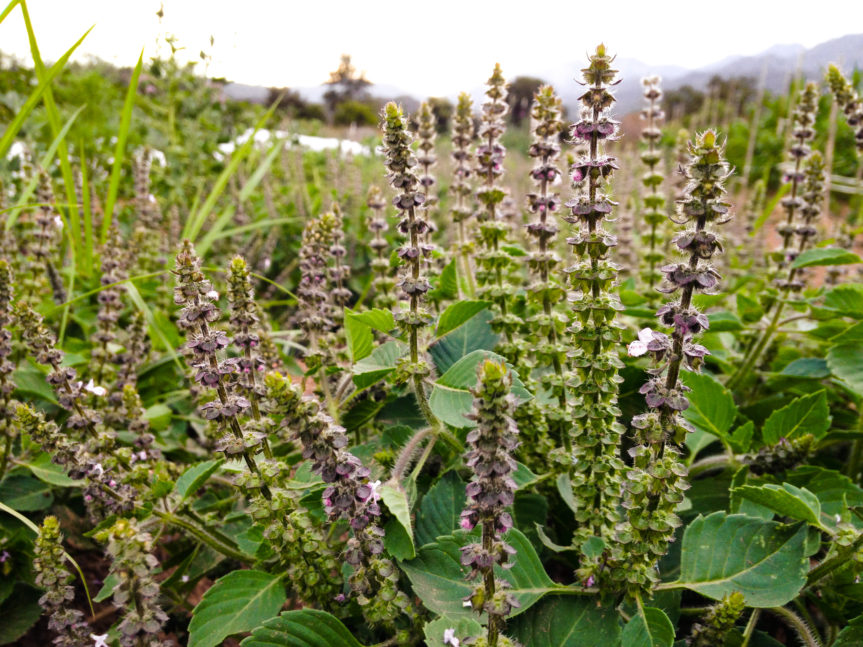I’ve been purchasing Holy Basil or Tulsi from the organic market on campus for a few years. After Andrew and I visited the Organic Farm on campus for our club research and we were able to help harvest and prep produce for the market, we decided to make some Tulsi tea with fresh herbs sourced on campus to share with the outdoor school class. A number of students enjoyed and were interested in the healing properties of Tulsi or Holy Basil – so here’s some information:

While basil is found on every continent, tulsi or holy basil (Ocimum sanctum) is indigenous to the Indian subcontinent. It is a bushy shrub that grows to about 18 inches in height. Its leaves are oval and serrated, with colors ranging from light green to dark purple, depending on the variety. In the wild, tulsi is an annual, but it can be kept as a perennial by trimming it before it forms seeds. The plant has delicate lavender-colored flowers, and its fruit consists of tiny rust-colored nuts.
Often referred to as holy basil, Tulsi is a potent herb that has been used in India for thousands of years to treat colds, coughs, and flu. According to Ayurveda**, tulsi promotes purity and lightness in the body, cleansing the respiratory tract of toxins and relieving digestive gas and bloating. Tulsi leaves offer a rich source of essential oil, containing eugenol, nerol, camphor, and a variety of terpenes and flavonoids. The oil is a strong antiseptic against many kinds of disease-causing organisms, including bacteria, fungi, and parasites.
In terms of the Ayurvedic doshas, tulsi carries the bitter, pungent, and astringent tastes and generates a warming influence on the physiology. The herb is predominantly Kapha-reducing, but it can also be used to pacify Vata and Pitta. However, it can have a mildly Pitta-aggravating effect in individuals who are severely overheated.
Tulsi has spiritual as well as medicinal significance in Ayurveda. In Hindu mythology, the plant is an incarnation of the goddess Tulsi, offering divine protection. Many Indian families keep a living Tulsi plant in their homes – tending to it with great care and reverence. The plant’s woody stalks are often made into beads used in meditation malas or rosaries.
- via: www.chopra.com
Tulsi Tea:
If you are looking for Tulsi as a pre-packaged tea it can be found in tea bags in a number of stores in Guelph. A good place to start would be the Stone Store or to visit New Age. If you would like the plant fresh – visit the Orangic Market Thursdays on campus (while there is still harvest) 3-6pm near Rozanski and purchase a bunch for $1.50. I ‘process’ the herbs by separating the flowers and leaves and drying them in baskets. I use the leaves for cooking and the flowers for tea. Alternatively you can hang the whole bunch upside down in your kitchen and just break off what you need.
** For anyone unfamiliar with Ayurveda – it is is a 5,000-year-old system of natural healing that has its origins in the Vedic culture of India.


You must be logged in to post a comment.